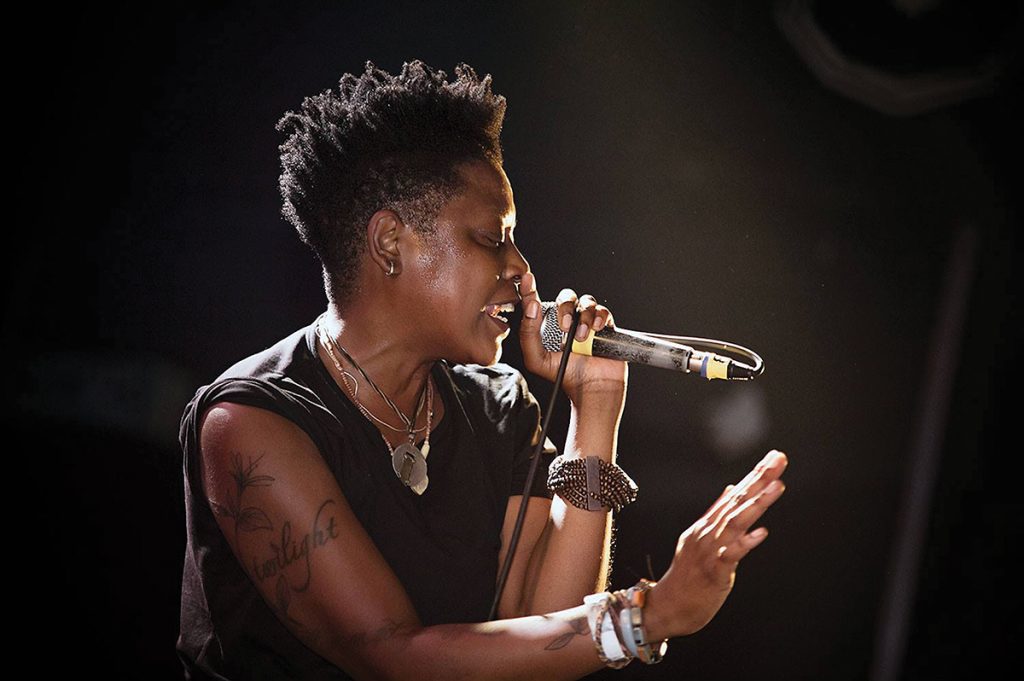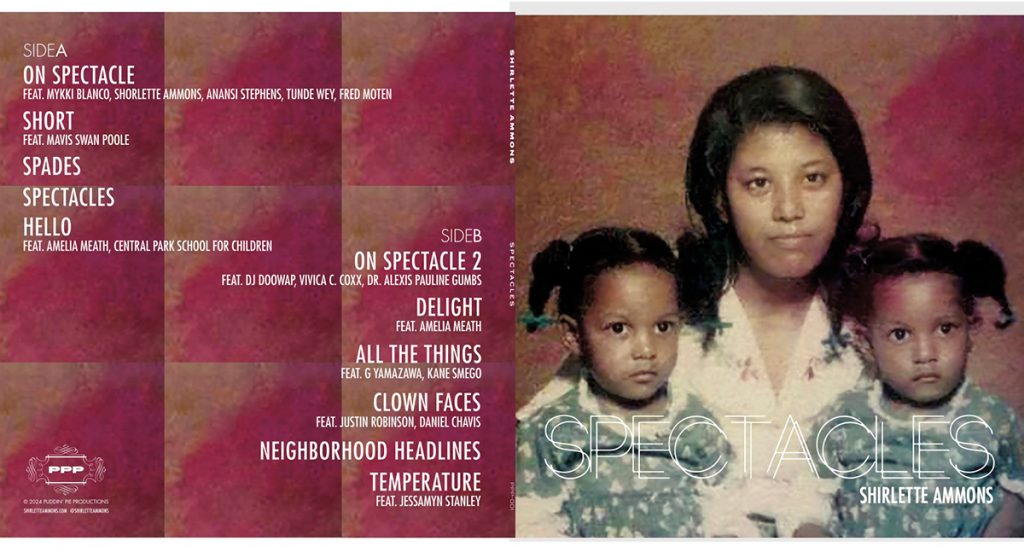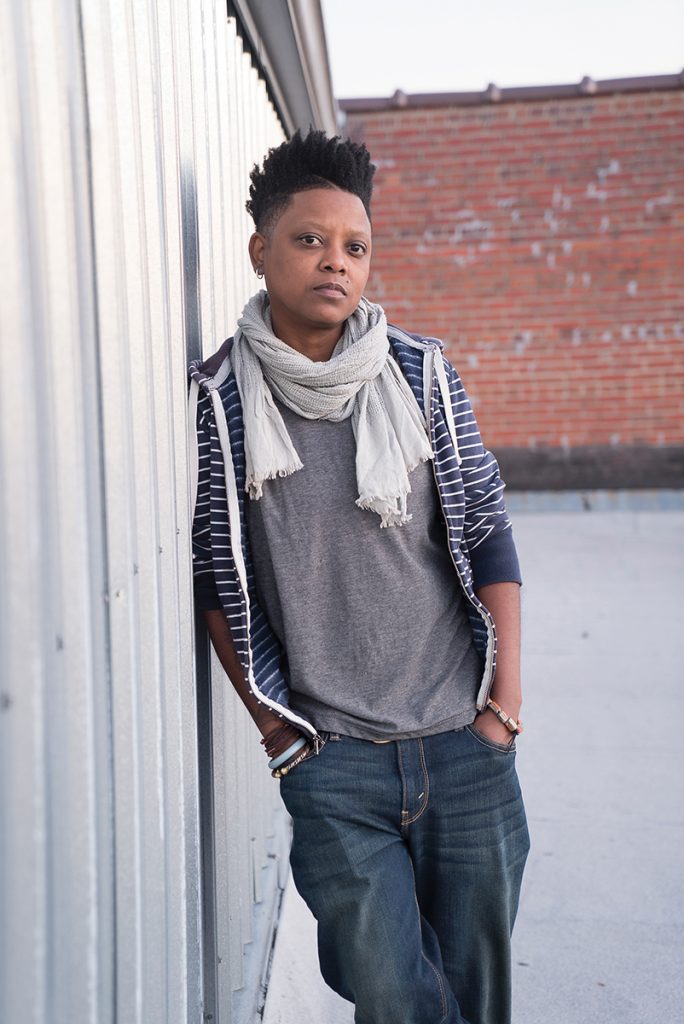The Durham-based musician’s latest album, Spectacles, explores identity and features cameos by lots of local talent.
by David Menconi

In life as well as art, Shirlette Ammons is a multi-hyphenate polyglot who crosses all kinds of borders and boundaries. A self-described Black queer Southern truth-teller, she is a poet, community activist and documentary film producer as well as a musician. And if you want a sense of her range of sounds and influences, all you have to do is check the credits of her brilliant 2024 album Spectacles, which was released in April.
Ammons’ collaborators on Spectacles include Amelia Meath and Nick Sanborn from Grammy-nominated electronic duo Sylvan Esso; rappers G. Yamazawa and Kane Smego; Justin Robinson from the Grammy-winning old-time string band Carolina Chocolate Drops; and players from The Veldt, Dante High, Hiss Golden Messenger and other rock bands. For good measure, students from Durham’s Central Park School For Children contributed a vocal cameo on one song.
It’s quite an all-star team that speaks to Ammons’ status as a connector.
“I kinda just don’t take ‘no’ for an answer,” she says of her collaborative ways. “I’m like a little pest. There’s just so much overlap in the Triangle’s creative communities, especially music. When I write a song, I’m harming it if I’m not delivering it right. So I won’t hesitate to get someone else to sing it or play it.”
Spectacles is the third full-length album Ammons has released, and it has broken out enough to pick up national acclaim. Back in May, music critic Greg Kot of the prestigious Chicago-based radio show Sound Opinions called it “an extraordinary record” and one of this year’s best.
“I screamed when I heard that! It was so dope,” Ammons says. “I listen to those guys regularly and love how pretentious they can be — reminds me of me! But it feels like they really listened critically and got into the concepts I was trying to achieve. That meant a lot to me. To be heard and seen by them felt affirming.”
A current resident of Durham, Ammons grew up in the tiny Duplin County township of Beautancus and has the drawl to prove it. Now 50 years old, she has an identical sister, Shorlette Ammons, who works as program director for the annual Farm Aid festival. A childhood picture of the sisters with their mother adorns the cover of Spectacles, although there is uncertainty about which sister is which.
“Damned if I know,” Shirlette says. “Educated guess, I’m on the right.”
Growing up “as one when you’re actually two,” as she puts it, was an early dichotomy for Ammons to negotiate — along with growing up gay in the rural South. Her early musical experiences were singing in church, and various aunts also introduced her to Southern soul and R&B.
Rock ’n’ roll entered the picture after Ammons moved to the Triangle, where she started playing bass and going to open-mic poetry nights. Taking it all in, she began honing a staccato style of her own, combining hip-hop, rapid-fire slam poetry, funk and overdrive rock ’n’ roll.
“I was a geek, just tunnel-vision on learning,” she says. “I started going to places where I would not necessarily belong, and I’d see what white kids were doing in rock clubs. It actually pissed me off: ‘Why are WE not doing that, being loud?’”
Ammons began singing with a local rock band, the Dynamite Brothers. She also worked as a producer on film and television projects, ranging from four seasons of the award-winning series A Chef’s Life to the rap group Little Brother’s 2023 documentary May The Lord Watch.

While Ammons made some waves with her second album, 2016’s Language Barrier, Spectacles stands as her new high-water mark. Despite all the guests, she says it was actually a lonely record to make because so much of the work happened in isolation during the pandemic shutdown.
But her steadfast co-producer throughout the project was Phil Cook, formerly of Hiss Golden Messenger and Megafaun. Questions of identity have been a recurrent songwriting topic throughout Ammons’ discography, and they are at the center of Spectacles. Framing the album are snippets of recorded voicemails from artist friends of hers talking about the different aspects of living one’s life as a spectacle.
“I love the title and the idea of all the different ways that concept can work,” Cook says. “There’s being a spectacle in the American landscape as a Black queer Southern artist subject to the white gaze. And also spectacles we wear — like coping mechanisms. Shirlette has always put so much into her writing about identity.”
Once she finished Spectacles, Ammons went shopping for record labels and had a few close calls where she almost got signed, but not quite. That brought on a minor crisis of faith, until she decided this record was too good to go unheard.
“It’s such a messed-up time in the music industry right now,” Ammons says with a sigh. “I still love making things like records, which feels satisfying. That’s the selfish motivation. Then the thing with record companies just fizzled out.
“But I believe in this record and I want people to hear it,” Ammons continues. “So that was my ‘come to Jesus’ moment, to put it out myself.”
The reception to Spectacles as an independent release has more than validated her faith in it. Cook agrees: “This is a seminal work for her.”
This article originally appeared in the October 2024 issue of WALTER magazine.





